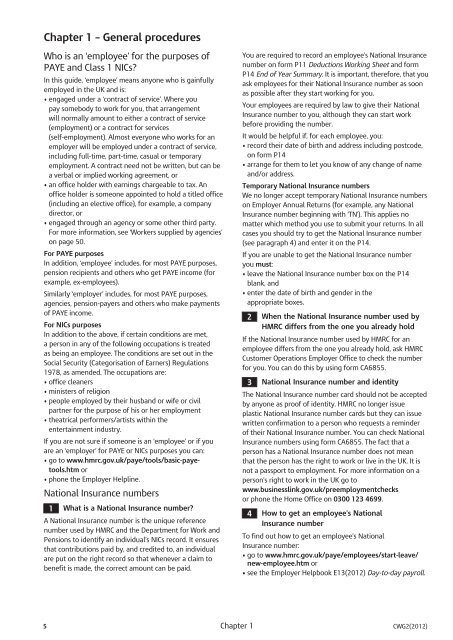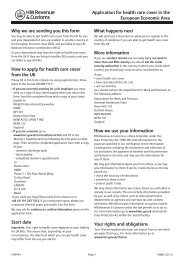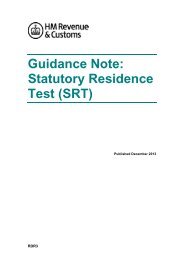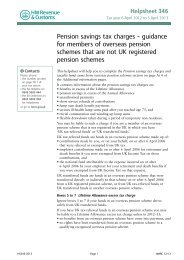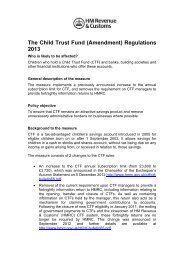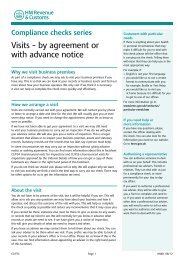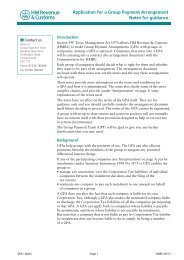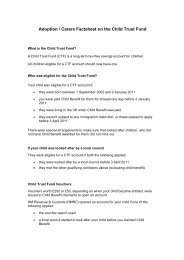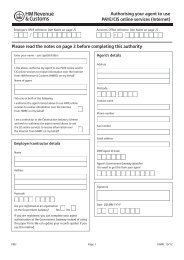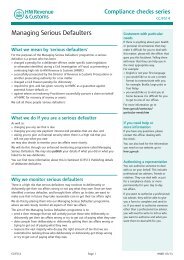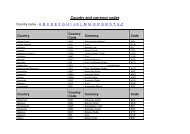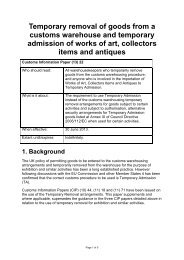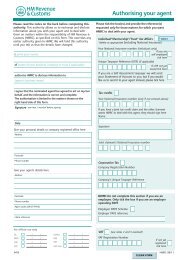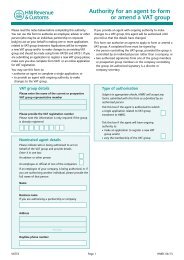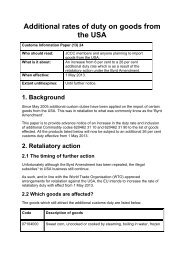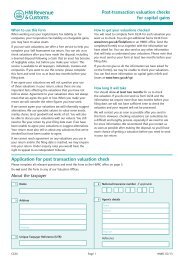Employer Further Guide to PAYE and NICs - HM Revenue & Customs
Employer Further Guide to PAYE and NICs - HM Revenue & Customs
Employer Further Guide to PAYE and NICs - HM Revenue & Customs
You also want an ePaper? Increase the reach of your titles
YUMPU automatically turns print PDFs into web optimized ePapers that Google loves.
Chapter 1 – General procedures<br />
Who is an ‘employee’ for the purposes of<br />
<strong>PAYE</strong> <strong>and</strong> Class 1 <strong>NICs</strong>?<br />
In this guide, ‘employee’ means anyone who is gainfully<br />
employed in the UK <strong>and</strong> is:<br />
• engaged under a ‘contract of service’. Where you<br />
pay somebody <strong>to</strong> work for you, that arrangement<br />
will normally amount <strong>to</strong> either a contract of service<br />
(employment) or a contract for services<br />
(self-employment). Almost everyone who works for an<br />
employer will be employed under a contract of service,<br />
including full-time, part-time, casual or temporary<br />
employment. A contract need not be written, but can be<br />
a verbal or implied working agreement, or<br />
• an office holder with earnings chargeable <strong>to</strong> tax. An<br />
office holder is someone appointed <strong>to</strong> hold a titled office<br />
(including an elective office), for example, a company<br />
direc<strong>to</strong>r, or<br />
• engaged through an agency or some other third party.<br />
For more information, see ‘Workers supplied by agencies’<br />
on page 50.<br />
For <strong>PAYE</strong> purposes<br />
In addition, ‘employee’ includes, for most <strong>PAYE</strong> purposes,<br />
pension recipients <strong>and</strong> others who get <strong>PAYE</strong> income (for<br />
example, ex-employees).<br />
Similarly ‘employer’ includes, for most <strong>PAYE</strong> purposes,<br />
agencies, pension-payers <strong>and</strong> others who make payments<br />
of <strong>PAYE</strong> income.<br />
For <strong>NICs</strong> purposes<br />
In addition <strong>to</strong> the above, if certain conditions are met,<br />
a person in any of the following occupations is treated<br />
as being an employee. The conditions are set out in the<br />
Social Security (Categorisation of Earners) Regulations<br />
1978, as amended. The occupations are:<br />
• office cleaners<br />
• ministers of religion<br />
• people employed by their husb<strong>and</strong> or wife or civil<br />
partner for the purpose of his or her employment<br />
• theatrical performers/artists within the<br />
entertainment industry.<br />
If you are not sure if someone is an ‘employee’ or if you<br />
are an ‘employer’ for <strong>PAYE</strong> or <strong>NICs</strong> purposes you can:<br />
• go <strong>to</strong> www.hmrc.gov.uk/paye/<strong>to</strong>ols/basic-paye<strong>to</strong>ols.htm<br />
or<br />
• phone the <strong>Employer</strong> Helpline.<br />
National Insurance numbers<br />
1 What is a National Insurance number?<br />
A National Insurance number is the unique reference<br />
number used by <strong>HM</strong>RC <strong>and</strong> the Department for Work <strong>and</strong><br />
Pensions <strong>to</strong> identify an individual’s <strong>NICs</strong> record. It ensures<br />
that contributions paid by, <strong>and</strong> credited <strong>to</strong>, an individual<br />
are put on the right record so that whenever a claim <strong>to</strong><br />
benefit is made, the correct amount can be paid.<br />
You are required <strong>to</strong> record an employee’s National Insurance<br />
number on form P11 Deductions Working Sheet <strong>and</strong> form<br />
P14 End of Year Summary. It is important, therefore, that you<br />
ask employees for their National Insurance number as soon<br />
as possible after they start working for you.<br />
Your employees are required by law <strong>to</strong> give their National<br />
Insurance number <strong>to</strong> you, although they can start work<br />
before providing the number.<br />
It would be helpful if, for each employee, you:<br />
• record their date of birth <strong>and</strong> address including postcode,<br />
on form P14<br />
• arrange for them <strong>to</strong> let you know of any change of name<br />
<strong>and</strong>/or address.<br />
Temporary National Insurance numbers<br />
We no longer accept temporary National Insurance numbers<br />
on <strong>Employer</strong> Annual Returns (for example, any National<br />
Insurance number beginning with ‘TN’). This applies no<br />
matter which method you use <strong>to</strong> submit your returns. In all<br />
cases you should try <strong>to</strong> get the National Insurance number<br />
(see paragraph 4) <strong>and</strong> enter it on the P14.<br />
If you are unable <strong>to</strong> get the National Insurance number<br />
you must:<br />
• leave the National Insurance number box on the P14<br />
blank, <strong>and</strong><br />
• enter the date of birth <strong>and</strong> gender in the<br />
appropriate boxes.<br />
2 When the National Insurance number used by<br />
<strong>HM</strong>RC differs from the one you already hold<br />
If the National Insurance number used by <strong>HM</strong>RC for an<br />
employee differs from the one you already hold, ask <strong>HM</strong>RC<br />
Cus<strong>to</strong>mer Operations <strong>Employer</strong> Office <strong>to</strong> check the number<br />
for you. You can do this by using form CA6855.<br />
3 National Insurance number <strong>and</strong> identity<br />
The National Insurance number card should not be accepted<br />
by anyone as proof of identity. <strong>HM</strong>RC no longer issue<br />
plastic National Insurance number cards but they can issue<br />
written confirmation <strong>to</strong> a person who requests a reminder<br />
of their National Insurance number. You can check National<br />
Insurance numbers using form CA6855. The fact that a<br />
person has a National Insurance number does not mean<br />
that the person has the right <strong>to</strong> work or live in the UK. It is<br />
not a passport <strong>to</strong> employment. For more information on a<br />
person’s right <strong>to</strong> work in the UK go <strong>to</strong><br />
www.businesslink.gov.uk/preemploymentchecks<br />
or phone the Home Office on 0300 123 4699.<br />
4 How <strong>to</strong> get an employee’s National<br />
Insurance number<br />
To find out how <strong>to</strong> get an employee’s National<br />
Insurance number:<br />
• go <strong>to</strong> www.hmrc.gov.uk/paye/employees/start-leave/<br />
new-employee.htm or<br />
• see the <strong>Employer</strong> Helpbook E13(2012) Day-<strong>to</strong>-day payroll.<br />
5 Chapter 1 CWG2(2012)


